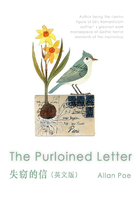Two days after the strange conclusion to Nastasia Philipovna's birthday party, with the record of which we concluded the first part of this story, Prince Muishkin hurriedly left St. Petersburg for Moscow, in order to see after some business connected with the receipt of his unexpected fortune.
It was said that there were other reasons for his hurried departure; but as to this, and as to his movements in Moscow, and as to his prolonged absence from St. Petersburg, we are able to give very little information.
The prince was away for six months, and even those who were most interested in his destiny were able to pick up very little news about him all that while. True, certain rumours did reach his friends, but these were both strange and rare, and each one contradicted the last.
Of course the Epanchin family was much interested in his movements, though he had not had time to bid them farewell before his departure. The general, however, had had an opportunity of seeing him once or twice since the eventful evening, and had spoken very seriously with him; but though he had seen the prince, as I say, he told his family nothing about the circumstance. In fact, for a month or so after his departure it was considered not the thing to mention the prince's name in the Epanchin household. Only Mrs. Epanchin, at the commencement of this period, had announced that she had been "cruelly mistaken in the prince!" and a day or two after, she had added, evidently alluding to him, but not mentioning his name, that it was an unalterable characteristic of hers to be mistaken in people. Then once more, ten days later, after some passage of arms with one of her daughters, she had remarked sententiously. "We have had enough of mistakes. I shall be more careful in future!" However, it was impossible to avoid remarking that there was some sense of oppression in the household—something unspoken, but felt; something strained. All the members of the family wore frowning looks. The general was unusually busy; his family hardly ever saw him.
As to the girls, nothing was said openly, at all events; and probably very little in private. They were proud damsels, and were not always perfectly confidential even among themselves. But they understood each other thoroughly at the first word on all occasions; very often at the first glance, so that there was no need of much talking as a rule.
One fact, at least, would have been perfectly plain to an outsider, had any such person been on the spot; and that was, that the prince had made a very considerable impression upon the family, in spite of the fact that he had but once been inside the house, and then only for a short time. Of course, if analyzed, this impression might have proved to be nothing more than a feeling of curiosity; but be it what it might, there it undoubtedly was.
Little by little, the rumours spread about town became lost in a maze of uncertainty. It was said that some foolish young prince, name unknown, had suddenly come into possession of a gigantic fortune, and had married a French ballet dancer. This was contradicted, and the rumour circulated that it was a young merchant who had come into the enormous fortune and married the great ballet dancer, and that at the wedding the drunken young fool had burned seventy thousand roubles at a candle out of pure bravado.
However, all these rumours soon died down, to which circumstance certain facts largely contributed. For instance, the whole of the Rogojin troop had departed, with him at their head, for Moscow. This was exactly a week after a dreadful orgy at the Ekaterinhof gardens, where Nastasia Philipovna had been present. It became known that after this orgy Nastasia Philipovna had entirely disappeared, and that she had since been traced to Moscow; so that the exodus of the Rogojin band was found consistent with this report.
There were rumours current as to Gania, too; but circumstances soon contradicted these. He had fallen seriously ill, and his illness precluded his appearance in society, and even at business, for over a month. As soon as he had recovered, however, he threw up his situation in the public company under General Epanchin's direction, for some unknown reason, and the post was given to another. He never went near the Epanchins' house at all, and was exceedingly irritable and depressed.
Varvara Ardalionovna married Ptitsin this winter, and it was said that the fact of Gania's retirement from business was the ultimate cause of the marriage, since Gania was now not only unable to support his family, but even required help himself.
We may mention that Gania was no longer mentioned in the Epanchin household any more than the prince was; but that a certain circumstance in connection with the fatal evening at Nastasia's house became known to the general, and, in fact, to all the family the very next day. This fact was that Gania had come home that night, but had refused to go to bed. He had awaited the prince's return from Ekaterinhof with feverish impatience.
On the latter's arrival, at six in the morning, Gania had gone to him in his room, bringing with him the singed packet of money, which he had insisted that the prince should return to Nastasia Philipovna without delay. It was said that when Gania entered the prince's room, he came with anything but friendly feelings, and in a condition of despair and misery; but that after a short conversation, he had stayed on for a couple of hours with him, sobbing continuously and bitterly the whole time. They had parted upon terms of cordial friendship.
The Epanchins heard about this, as well as about the episode at Nastasia Philipovna's. It was strange, perhaps, that the facts should become so quickly, and fairly accurately, known. As far as Gania was concerned, it might have been supposed that the news had come through Varvara Ardalionovna, who had suddenly become a frequent visitor of the Epanchin girls, greatly to their mother's surprise. But though Varvara had seen fit, for some reason, to make friends with them, it was not likely that she would have talked to them about her brother. She had plenty of pride, in spite of the fact that in thus acting she was seeking intimacy with people who had practically shown her brother the door. She and the Epanchin girls had been acquainted in childhood, although of late they had met but rarely. Even now Varvara hardly ever appeared in the drawing-room, but would slip in by a back way. Lizabetha Prokofievna, who disliked Varvara, although she had a great respect for her mother, was much annoyed by this sudden intimacy, and put it down to the general "contrariness" of her daughters, who were "always on the lookout for some new way of opposing her." Nevertheless, Varvara continued her visits.
A month after Muishkin's departure, Mrs. Epanchin received a letter from her old friend Princess Bielokonski (who had lately left for Moscow), which letter put her into the greatest good humour. She did not divulge its contents either to her daughters or the general, but her conduct towards the former became affectionate in the extreme. She even made some sort of confession to them, but they were unable to understand what it was about. She actually relaxed towards the general a little—he had been long disgraced—and though she managed to quarrel with them all the next day, yet she soon came round, and from her general behaviour it was to be concluded that she had bad good news of some sort, which she would like, but could not make up her mind, to disclose.
However, a week later she received another letter from the same source, and at last resolved to speak.
She solemnly announced that she had heard from old Princess Bielokonski, who had given her most comforting news about "that queer young prince." Her friend had hunted him up, and found that all was going well with him. He had since called in person upon her, making an extremely favourable impression, for the princess had received him each day since, and had introduced him into several good houses.
The girls could see that their mother concealed a great deal from them, and left out large pieces of the letter in reading it to them.
However, the ice was broken, and it suddenly became possible to mention the prince's name again. And again it became evident how very strong was the impression the young man had made in the household by his one visit there. Mrs. Epanchin was surprised at the effect which the news from Moscow had upon the girls, and they were no less surprised that after solemnly remarking that her most striking characteristic was "being mistaken in people" she should have troubled to obtain for the prince the favour and protection of so powerful an old lady as the Princess Bielokonski. As soon as the ice was thus broken, the general lost no time in showing that he, too, took the greatest interest in the subject. He admitted that he was interested, but said that it was merely in the business side of the question. It appeared that, in the interests of the prince, he had made arrangements in Moscow for a careful watch to be kept upon the prince's business affairs, and especially upon Salaskin. All that had been said as to the prince being an undoubted heir to a fortune turned out to be perfectly true; but the fortune proved to be much smaller than was at first reported. The estate was considerably encumbered with debts; creditors turned up on all sides, and the prince, in spite of all advice and entreaty, insisted upon managing all matters of claim himself—which, of course, meant satisfying everybody all round, although half the claims were absolutely fraudulent.
Mrs. Epanchin confirmed all this. She said the princess had written to much the same effect, and added that there was no curing a fool. But it was plain, from her expression of face, how strongly she approved of this particular young fool's doings. In conclusion, the general observed that his wife took as great an interest in the prince as though he were her own son; and that she had commenced to be especially affectionate towards Aglaya was a self-evident fact.
All this caused the general to look grave and important. But, alas! this agreeable state of affairs very soon changed once more.
A couple of weeks went by, and suddenly the general and his wife were once more gloomy and silent, and the ice was as firm as ever. The fact was, the general, who had heard first, how Nastasia Philipovna had fled to Moscow and had been discovered there by Rogojin; that she had then disappeared once more, and been found again by Rogojin, and how after that she had almost promised to marry him, now received news that she had once more disappeared, almost on the very day fixed for her wedding, flying somewhere into the interior of Russia this time, and that Prince Muishkin had left all his affairs in the hands of Salaskin and disappeared also—but whether he was with Nastasia, or had only set off in search of her, was unknown.
Lizabetha Prokofievna received confirmatory news from the princess—and alas, two months after the prince's first departure from St. Petersburg, darkness and mystery once more enveloped his whereabouts and actions, and in the Epanchin family the ice of silence once more formed over the subject. Varia, however, informed the girls of what had happened, she having received the news from Ptitsin, who generally knew more than most people.
To make an end, we may say that there were many changes in the Epanchin household in the spring, so that it was not difficult to forget the prince, who sent no news of himself.
The Epanchin family had at last made up their minds to spend the summer abroad, all except the general, who could not waste time in "travelling for enjoyment," of course. This arrangement was brought about by the persistence of the girls, who insisted that they were never allowed to go abroad because their parents were too anxious to marry them off. Perhaps their parents had at last come to the conclusion that husbands might be found abroad, and that a summer's travel might bear fruit. The marriage between Alexandra and Totski had been broken off. Since the prince's departure from St. Petersburg no more had been said about it; the subject had been dropped without ceremony, much to the joy of Mrs. General, who, announced that she was "ready to cross herself with both hands" in gratitude for the escape. The general, however, regretted Totski for a long while. "Such a fortune!" he sighed, "and such a good, easy-going fellow!"
After a time it became known that Totski had married a French marquise, and was to be carried off by her to Paris, and then to Brittany.
"Oh, well," thought the general, "he's lost to us for good, now."
So the Epanchins prepared to depart for the summer.
But now another circumstance occurred, which changed all the plans once more, and again the intended journey was put off, much to the delight of the general and his spouse.
A certain Prince S——arrived in St. Petersburg from Moscow, an eminent and honourable young man. He was one of those active persons who always find some good work with which to employ themselves. Without forcing himself upon the public notice, modest and unobtrusive, this young prince was concerned with much that happened in the world in general.
He had served, at first, in one of the civil departments, had then attended to matters connected with the local government of provincial towns, and had of late been a corresponding member of several important scientific societies. He was a man of excellent family and solid means, about thirty-five years of age.
Prince S——made the acquaintance of the general's family, and Adelaida, the second girl, made a great impression upon him. Towards the spring he proposed to her, and she accepted him. The general and his wife were delighted. The journey abroad was put off, and the wedding was fixed for a day not very distant.
The trip abroad might have been enjoyed later on by Mrs. Epanchin and her two remaining daughters, but for another circumstance.
It so happened that Prince S——introduced a distant relation of his own into the Epanchin family—one Evgenie Pavlovitch, a young officer of about twenty-eight years of age, whose conquests among the ladies in Moscow had been proverbial. This young gentleman no sooner set eyes on Aglaya than he became a frequent visitor at the house. He was witty, well-educated, and extremely wealthy, as the general very soon discovered. His past reputation was the only thing against him.
Nothing was said; there were not even any hints dropped; but still, it seemed better to the parents to say nothing more about going abroad this season, at all events. Aglaya herself perhaps was of a different opinion.
All this happened just before the second appearance of our hero upon the scene.
By this time, to judge from appearances, poor Prince Muishkin had been quite forgotten in St. Petersburg. If he had appeared suddenly among his acquaintances, he would have been received as one from the skies; but we must just glance at one more fact before we conclude this preface.
Colia Ivolgin, for some time after the prince's departure, continued his old life. That is, he went to school, looked after his father, helped Varia in the house, and ran her errands, and went frequently to see his friend, Hippolyte.
The lodgers had disappeared very quickly—Ferdishenko soon after the events at Nastasia Philipovna's, while the prince went to Moscow, as we know. Gania and his mother went to live with Varia and Ptitsin immediately after the latter's wedding, while the general was housed in a debtor's prison by reason of certain IOU's given to the captain's widow under the impression that they would never be formally used against him. This unkind action much surprised poor Ardalion Alexandrovitch, the victim, as he called himself, of an "unbounded trust in the nobility of the human heart."
When he signed those notes of hand he never dreamt that they would be a source of future trouble. The event showed that he was mistaken. "Trust in anyone after this! Have the least confidence in man or woman!" he cried in bitter tones, as he sat with his new friends in prison, and recounted to them his favourite stories of the siege of Kars, and the resuscitated soldier. On the whole, he accommodated himself very well to his new position. Ptitsin and Varia declared that he was in the right place, and Gania was of the same opinion. The only person who deplored his fate was poor Nina Alexandrovna, who wept bitter tears over him, to the great surprise of her household, and, though always in feeble health, made a point of going to see him as often as possible.
Since the general's "mishap," as Colia called it, and the marriage of his sister, the boy had quietly possessed himself of far more freedom. His relations saw little of him, for he rarely slept at home. He made many new friends; and was moreover, a frequent visitor at the debtor's prison, to which he invariably accompanied his mother. Varia, who used to be always correcting him, never spoke to him now on the subject of his frequent absences, and the whole household was surprised to see Gania, in spite of his depression, on quite friendly terms with his brother. This was something new, for Gania had been wont to look upon Colia as a kind of errand-boy, treating him with contempt, threatening to "pull his ears," and in general driving him almost wild with irritation. It seemed now that Gania really needed his brother, and the latter, for his part, felt as if he could forgive Gania much since he had returned the hundred thousand roubles offered to him by Nastasia Philipovna. Three months after the departure of the prince, the Ivolgin family discovered that Colia had made acquaintance with the Epanchins, and was on very friendly terms with the daughters. Varia heard of it first, though Colia had not asked her to introduce him. Little by little the family grew quite fond of him. Madame Epanchin at first looked on him with disdain, and received him coldly, but in a short time he grew to please her, because, as she said, he "was candid and no flatterer"——a very true description. From the first he put himself on an equality with his new friends, and though he sometimes read newspapers and books to the mistress of the house, it was simply because he liked to be useful.
One day, however, he and Lizabetha Prokofievna quarrelled seriously about the "woman question," in the course of a lively discussion on that burning subject. He told her that she was a tyrant, and that he would never set foot in her house again. It may seem incredible, but a day or two after, Madame Epanchin sent a servant with a note begging him to return, and Colia, without standing on his dignity, did so at once.
Aglaya was the only one of the family whose good graces he could not gain, and who always spoke to him haughtily, but it so happened that the boy one day succeeded in giving the proud maiden a surprise.
It was about Easter, when, taking advantage of a momentary tete-a-tete Colia handed Aglaya a letter, remarking that he "had orders to deliver it to her privately." She stared at him in amazement, but he did not wait to hear what she had to say, and went out. Aglaya broke the seal, and read as follows:
"Once you did me the honour of giving me your confidence. Perhaps you have quite forgotten me now! How is it that I am writing to you? I do not know; but I am conscious of an irresistible desire to remind you of my existence, especially you. How many times I have needed all three of you; but only you have dwelt always in my mind's eye. I need you—I need you very much. I will not write about myself. I have nothing to tell you. But I long for you to be happy. ARE you happy? That is all I wished to say to you—Your brother,
"PR. L. MUISHKIN."
On reading this short and disconnected note, Aglaya suddenly blushed all over, and became very thoughtful.
It would be difficult to describe her thoughts at that moment. One of them was, "Shall I show it to anyone?" But she was ashamed to show it. So she ended by hiding it in her table drawer, with a very strange, ironical smile upon her lips.
Next day, she took it out, and put it into a large book, as she usually did with papers which she wanted to be able to find easily. She laughed when, about a week later, she happened to notice the name of the book, and saw that it was Don Quixote, but it would be difficult to say exactly why.
I cannot say, either, whether she showed the letter to her sisters.
But when she had read it herself once more, it suddenly struck her that surely that conceited boy, Colia, had not been the one chosen correspondent of the prince all this while. She determined to ask him, and did so with an exaggerated show of carelessness. He informed her haughtily that though he had given the prince his permanent address when the latter left town, and had offered his services, the prince had never before given him any commission to perform, nor had he written until the following lines arrived, with Aglaya's letter. Aglaya took the note, and read it.
"DEAR COLIA,—Please be so kind as to give the enclosed sealed letter to Aglaya Ivanovna. Keep well—Ever your loving,
"PR. L. MUISHKIN."
"It seems absurd to trust a little pepper-box like you," said Aglaya, as she returned the note, and walked past the "pepper-box" with an expression of great contempt.
This was more than Colia could bear. He had actually borrowed Gania's new green tie for the occasion, without saying why he wanted it, in order to impress her. He was very deeply mortified.















